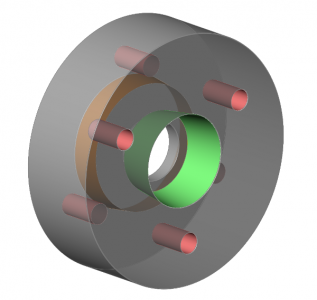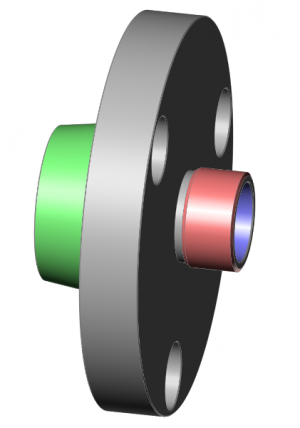I am planning on turning a D1-4 camlock backplate for my lathe. In the past, I have made an ER20 collet bar (that I just hold in the 4-jaw) using 4130 in the annealed condition, as well as an MT-2 gear cutter arbor, and I was quite happy with the way it machined.
This time round, I am considering buying the 4130 (actually, EN19) in the "pre-hard" condition, which should be about RC30, which still sounds easy enough to turn. I mostly hope that the harder condition will last longer in its role as D1-4 backplate, but I suspect that even in the annealed condition the 4130 will be adequate.
Then I saw a recent video by John Grimsmo where he briefly showed a part that was machined from 4130 (plate stock, I assumed), which distorted quite badly (just from the machining, no HT). I suspect that plate stock 4130 is probably cold-rolled, which would explain the distortion (considering the anisotropic grain structure that would result).
Finally, my question: should I worry about similar distortion when turning a large part (such as the D1-4 backplate) from round stock, in either the annealed or "pre-hard" condition? Or is the grain structure of the bar stock still relatively isotropic?
This time round, I am considering buying the 4130 (actually, EN19) in the "pre-hard" condition, which should be about RC30, which still sounds easy enough to turn. I mostly hope that the harder condition will last longer in its role as D1-4 backplate, but I suspect that even in the annealed condition the 4130 will be adequate.
Then I saw a recent video by John Grimsmo where he briefly showed a part that was machined from 4130 (plate stock, I assumed), which distorted quite badly (just from the machining, no HT). I suspect that plate stock 4130 is probably cold-rolled, which would explain the distortion (considering the anisotropic grain structure that would result).
Finally, my question: should I worry about similar distortion when turning a large part (such as the D1-4 backplate) from round stock, in either the annealed or "pre-hard" condition? Or is the grain structure of the bar stock still relatively isotropic?



